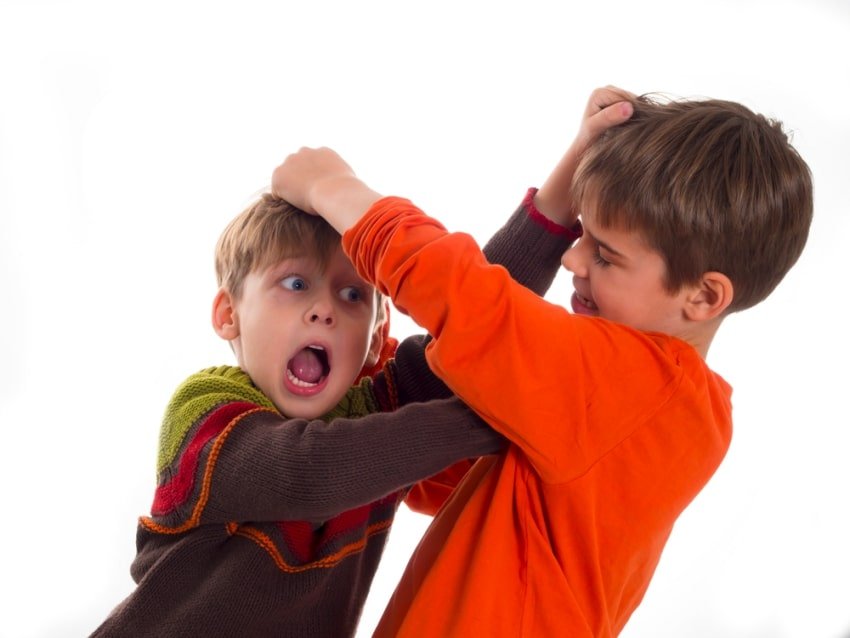Why can’t your kids just get along? Are you tired of listening to the fighting all day? Are you fed up with breaking up fights hundreds of times a day? You are not alone. This is how every parent with more than one child feels at some point.
Sibling rivalry, bickering, she said he said, physical fights; whatever you call it, it is frustrating, upsetting, and exhausting!
As much as it drives us crazy, sibling disagreements are a normal part of growing up. It teaches our children critical skills such as conflict resolution, patience, and knowing what triggers their anger.
These are all skills that will benefit them enormously as they grow up.
Is It Normal For Siblings To Fight?
Yes, of course, it is. A lot of emotions are involved between siblings, and this sometimes raises itself as fighting, arguing, and sibling rivalry. They may not even know why they are fighting.
Maybe they are tired, hungry, or want mom or dad’s attention. They may simply be sick of being in each other’s company so much.
For younger children, the fight maybe because they do not know how to express their feelings. They can not convey what they want to happen or what they want to stop happening. At a young age, it is tough for them to express what is bothering them clearly.
And this can often result in fighting over something seemingly tiny, but it may be the straw that broke the camels back, so to speak!
View in gallery
Why Do They Fight?
There are so many possible reasons why siblings fight. Below are the most common causes of sibling fighting.
Boredom
This is the cause of most sibling squabbles. Your children are bored. The weather is shocking, so going outside is out of the question. What is the best way for them to entertain themselves?
Sometimes, that is by annoying someone who will give them a great reaction – their sibling!
Obviously, the best way to prevent this cause of fighting is to ensure that your children are constantly entertained and occupied. However, in reality, this is just an impossible task.
We cannot keep our children fully engaged and entertained from the minute they wake up to the minute they go to sleep. So we have to tackle it differently.
Do not ignore the fighting and just punish your child; this is a really unhelpful strategy, but one every parent is guilty of, especially when you have a million things to complete.
Instead, try to casually separate the siblings so you can relieve the build-up of tension but do not make this a forced separation. Another good tactic is giving them a job to do with someone else in the house.
Again, this provides them with a new person and gives them a focus.
Parental Attention
No matter what we do as parents, there is never enough time to spend with our children and maintain our work, home, and life. This leads to children feeling unnoticed, unloved.
In response to this, they will fight for any attention from us, whether positive or negative. So instead of spending the little spare time that we do have shouting at our children and breaking up fights.
It would be better to ignore the fighting and try to spend some quality time with them. This should not be used as a reward for bad behavior but should only be given when the fighting has subsided.
You could schedule a date night, movie night, or games night. This will provide them with the attention that they need and hopefully lessen the fighting.
Try playing some child-friendly board or card games together and bond with your children.
[amalinkspro type=”showcase” asin=”B00GTJSGXE” apilink=”https://www.amazon.com/dp/B00GTJSGXE?tag=mominformedcom-20&linkCode=osi&th=1&psc=1″ new-window=”true” addtocart=”false” nofollow=”true” sc-id=”4″ imgs=”LargeImage” link-imgs=”false” specs=”Innovative entertainment~~~Expertly designed~~~Hours of fun~~~Quality components~~~Brand new in factory packaging~~~” btn-color=”#ff9900″ btn-text=”Buy on Amazon” alignment=”aligncenter” hide-prime=”0″ hide-image=”0″ hide-reviews=”0″ hide-price=”0″ hide-button=”0″ width=”750″]Mattel UNO: Classic Card Game[/amalinkspro]
Let Them Know That They Are In This Together
As parents, we all do it. We put all the responsibility of starting and finishing an argument with the oldest child. We generally have much higher expectations of them even though they may be quite young too.
I know as a parent, I am guilty of this with my three-year-old and two-year-old boys. In fact, also with my older children when they were younger.
This does not make us bad parents; it is just how we are pre-wired. Studies have shown that this expectation makes the eldest children more successful and smarter!
Do not label one child as the ‘naughty one’ and one as the ‘poor victim.’ This will only show that being weak and playing the poor victim will get your attention.
View in gallery
Another issue with this tactic is that you might be unaware of the build-up to the fight and may not be getting the full picture. When children are small, it is difficult for them to express events in chronological order clearly.
Another cause of fights, especially for a younger child, is that they feel that they always come way down the list of priorities and get frustrated as they cannot do what their older sibling can. But there is a way that we can resolve this issue.
Make sure that your children understand that they are both in the same boat together. They are the children, and you are the parents. They all have to follow your rules.
Use encouragement to get your children to be at each other’s side. Defend and support each other even when they are in the wrong. Be warned. This may mean that they sometimes will partner up against you.
Nothing brings warring parties together like a common enemy!
Time
One to one time with your children is very important. I know how difficult it can be to find this time in our hectic lives.
But if we can give them this undivided attention regularly, they will not mind sharing you with their siblings or feel as though they need to compete with their siblings.
Positive attention each day is vital to their mental well being. Dedicate time to them every day, get down to their level, play with them, engage with them in their world, and not in our boring grown-up world.
This attention will allow you to build emotional connections and to learn what triggers the sibling rivalry. Once you understand the triggers, you can eliminate them from your child’s daily life and give yourself a well-needed break from the squabbling.
View in gallery
They Are All different
Even though the advice above is to try and get your children to support each other and accept that they are all in this together, it does not mean that you should not recognize and celebrate their differences.
With this in mind, we need to make our children aware that being treated equally and fairly does not mean that they will be treated the same. Each child should be treated as an individual and fairly, taking into account their uniqueness.
If they feel that they have been mistreated, let them explain. Hear them out. It is then up to you as the adult to explain to them why they have been treated differently.
They may want to go to bed at the same time as their big brother/sister, tell that when they are not so tired in the morning, you can look at a later bedtime.
Listening
All children need to feel heard because they need to feel that someone is listening and acknowledging their feelings. Sibling fighting and rivalry is the perfect teaching tool and can help children to develop their emotional intelligence.
Instead of allowing the screaming, shouting and name-calling, bring it down a level and let each child have their say without interruptions or comments from the other party. Encourage them to say how they feel rather than the actual cause of the fight.
For example, instead of saying, “I hate him because he broke my favorite toy.” Try, “I feel angry and hurt, that was my favorite toy, and I loved it.” This will help the other child to display empathy and understanding rather than anger and defensiveness.
Let Them Solve Their Own Disputes
Following on from listening to them and developing their emotional intelligence, we can then add another layer to their emotional development by allowing them to solve their own disputes.
View in gallery
When you see a fight brewing, step in and say something like, ” I know that you two are great problem solvers, so I’ll be back in 3 minutes to hear how you want to solve this problem.”
You may need to temporarily remove a toy if it is the cause of the fight. You have now put the ball back in their court and give them another focus rather than the original fight.
When you return, hear out their proposal and see if both parties are happy with the resolution. Then ensure that you provide huge praise for their problem-solving skills, cooperation, and working together.
Children will often surprise us adults with innovative problem-solving.
Give Credit Where Credit Is Due
As with all areas of parenting, make sure that you give credit where credit is due.
When your children are playing nice and getting along, praise them for it. You could use treats and rewards to reinforce this good behavior.
For younger children, maybe a ‘Getting along with my sibling’ sticker chart may be more of an incentive. For older children, the promise of a special treat like going to the movies together or shopping trip (this is, of course, age dependant).
Keep It Simple
Children, especially younger ones, see things in a very black and white, right and wrong way. The best thing to do, no matter which option you choose is to keep it simple.
The simpler the resolution, the easier it will be for them to understand the purpose and outcomes.
When Sibling Fights Turn Physical
There may be a time when sibling fighting can escalate from shouting and screaming to physical fighting.
View in gallery
This can be very difficult for parents to resolve as we do not want anyone to hurt our little cub, but when it is their sibling, another of our little cubs, it is extremely hard for us not to take sides.
If physical violence and punches are involved, then you as the parent need to call a timeout. Try not to take sides but instead just provide a safe space for both parties.
Try not to take sides even if you believe that one sibling is the clear perpetrator. You didn’t see the build-up, the mean words that were said, or the actions that preceded the fight.
Try not to take sides. The littlest person is not always the innocent party. When you step in, give each party space and use the recommendations above to resolve the fighting.
The Final Word
As parents, siblings are always going to fight, but we need to provide them with techniques to resolve their differences fairly.
By providing them with these opportunities, we can not only have a calmer home life but also develop our children’s emotional skills. You are providing your children with an immense gift that will give them advantages later in life.
After all, siblings are forever, they can be best friends for life and provide unwavering support to each other, but they are going to need our help to guide them down the right path!






